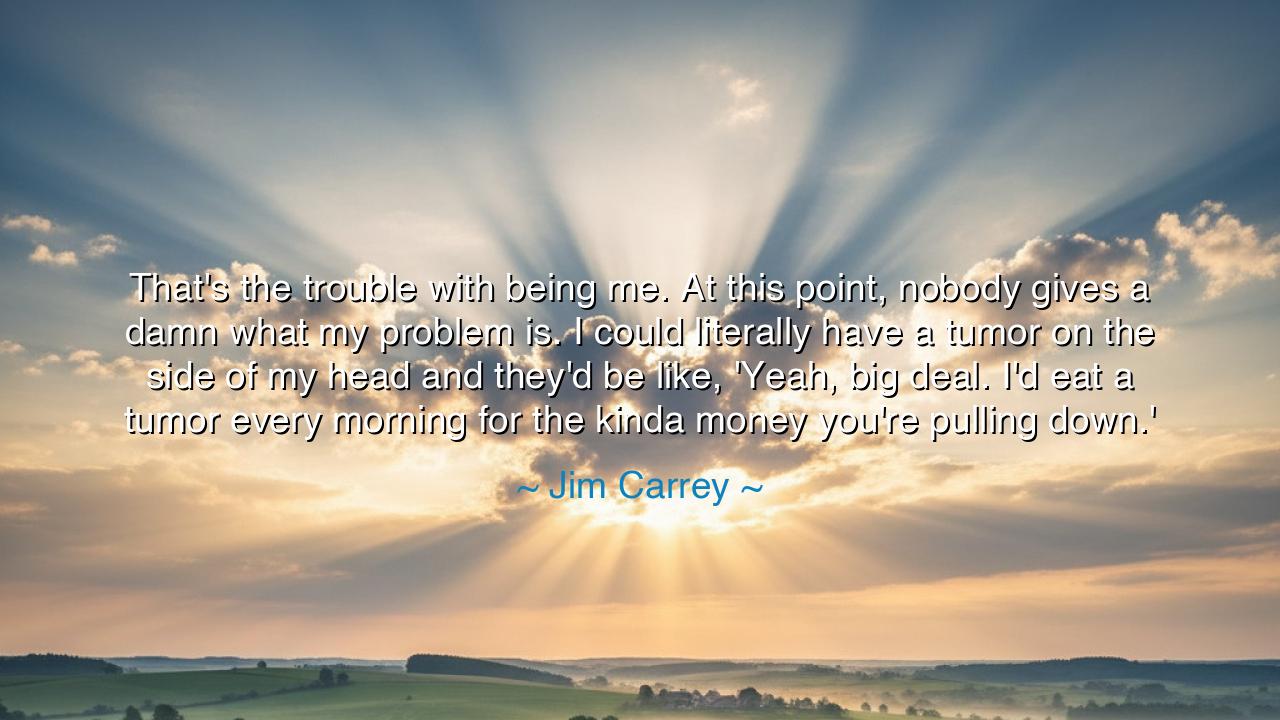
That's the trouble with being me. At this point, nobody gives a
That's the trouble with being me. At this point, nobody gives a damn what my problem is. I could literally have a tumor on the side of my head and they'd be like, 'Yeah, big deal. I'd eat a tumor every morning for the kinda money you're pulling down.'






The words of Jim Carrey, when he declared, “That’s the trouble with being me. At this point, nobody gives a damn what my problem is. I could literally have a tumor on the side of my head and they’d be like, ‘Yeah, big deal. I’d eat a tumor every morning for the kinda money you’re pulling down,’” are not spoken lightly. Beneath the humor and exaggeration lies a lament as old as civilization itself: the burden of those who dwell in the light of fame and fortune. His cry is not the jest of a clown, but the confession of a soul weary beneath the weight of expectation. For in truth, when men rise to the heights of wealth or glory, the world forgets their humanity and demands of them only spectacle, gain, and endless endurance.
Behold the paradox: when a man is lowly, his neighbors may pity his wounds and rush to ease his suffering. But when he is exalted, crowned with success and showered with riches, his pains are dismissed as trifles. Suffering, when borne by the powerful, is mocked, as if gold and applause could soothe every ache of the heart. Thus speaks Carrey—not as a jest but as an oracle—reminding us that no man, however rich or adored, is freed from the human condition. He cries out against a world that measures compassion not by shared humanity, but by status, dismissing the woes of the prosperous as though they are unworthy of sympathy.
History is not silent on this truth. Consider Emperor Marcus Aurelius, the philosopher-king of Rome. Surrounded by wealth, soldiers, and glory, he too wrote in his Meditations of the crushing solitude that came with power. Though he ruled the mightiest empire of his age, he confessed that sorrow and mortality gnawed at him like any other man. Did the people of Rome care for his grief? Few did, for they looked only to their emperor to lead, to conquer, to provide bread and circuses. To them his inner wounds were invisible, even irrelevant. Just as Carrey jested that none would care if he bore a tumor, so too Marcus Aurelius bore the tumor of loneliness, hidden beneath the robes of empire.
In Carrey’s voice we hear also the echo of every artist who has risen to fame only to find that his humanity has been consumed by the role he plays. He was loved for his laughter, his boundless energy, his wild performances. Yet when his soul whispered of sorrow, who was there to listen? The people demanded the mask, not the man. And thus he lamented that he could be struck down by illness or despair, and still the world would shrug, saying, “What right has he to suffer, when fortune has favored him so greatly?” This is the bitter irony of the human heart: envy blinds compassion, and wealth hides pain from those unwilling to look deeper.
The teaching is clear, O seekers of wisdom: do not judge the worth of another’s pain by the weight of their purse or the brilliance of their crown. Suffering knows no rank, no fame, no fortune. To dismiss the grief of the wealthy is as cruel as ignoring the hunger of the poor, for both are wounds of the human spirit. Compassion must not be rationed by envy, but poured freely upon all, for each soul walks its own battle unseen by others.
What, then, shall we do with this knowledge? First, we must train our hearts to see beyond appearances. If a friend, a leader, or even a stranger confesses sorrow, resist the impulse to compare their suffering to your own. Do not say, “Your pain is less than mine because you are richer, greater, or stronger.” Instead, say, “You are human, and thus your pain matters.” Second, we must remember that fame and fortune are not shields against despair. Offer kindness even to those whom the world deems untouchable, for they may be lonelier than any beggar in the street.
Let us carry forward this lesson: that empathy is the true measure of civilization. Rich or poor, celebrated or forgotten, each soul deserves to be heard. If we harden our hearts to the suffering of those who seem to have everything, we make the same error as the crowd who watched gladiators bleed in the Colosseum, cheering as men perished for their amusement. Let us instead be like the wise few who offered water to the fallen, who knew that beneath the crown and the mask, there beats a heart like our own.
Thus the words of Jim Carrey, spoken in jest yet heavy with truth, become a torch for future generations: to see beyond wealth, beyond fame, beyond the illusions of envy, and to remember always that every man and woman is mortal, fragile, and worthy of compassion. And when we live this way, we do not merely comfort others—we lift the burden of isolation from our own hearts as well, becoming a people whose greatness is measured not by riches, but by mercy.






AAdministratorAdministrator
Welcome, honored guests. Please leave a comment, we will respond soon